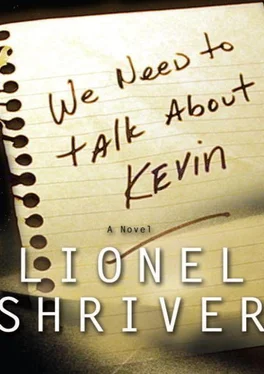I recognize that the portrait I’m painting here is not attractive , and for that matter I can’t remember the last time I felt attractive, to myself or anyone else. In fact, years before I got pregnant myself I met a young woman at the White Horse in the Village with whom I’d gone to college in Green Bay. Though we hadn’t spoken since then, she had recently given birth to her own first child, and I needed only to say hi for her to begin spewing her despair. Compact, with unusually broad shoulders and close curly black hair, Rita was an attractive woman—in the physical sense. With no solicitation on my part she regaled me with the irreproachable state of her physique before she conceived. Apparently she’d been using the Nautilus every day, and her definition had never been so sharp, her fatto-muscle ratio was unreal, her aerobic conditioning topping the charts. Then pregnancy, well it was terrible ! The Nautilus just didn’t feel good any more and she’d had to stop—. Now, now, she was a mess , she could hardly do a sit-up, much less three sets of proper crunches, she was starting from scratch or worse —! This woman was fuming, Franklin; she clearly muttered about her abdominal muscles when she seethed down the street. Yet at no point did she mention the name of her child, its sex, its age, or its father. I remember stepping back, excusing myself to the bar, and slipping away without telling Rita good-bye. What had most mortified me, what I had to flee, was that she sounded not only unfeeling and narcissistic but just like me .
I’m no longer sure whether I rued our first child before he was even born. It’s hard for me to reconstruct that period without contaminating the memories with the outsized regret of later years, a regret that bursts the constraints of time and gushes into the period when Kevin wasn’t there yet to wish away. But the last thing I’ve wanted is to whitewash my own part in this terrible story. That said, I’m determined to accept due responsibility for every wayward thought, every petulance, every selfish moment, not in order to gather all the blame to myself but to admit this is my fault and that is my fault but there , there , precisely there is where I draw a line and on the other side, that , that , Franklin , that is not .
Yet to draw that line I fear I must advance to its very edge.
By the last month, the pregnancy was almost fun. I was so ungainly that the condition had a goofy novelty, and for a woman who had always been so conscientiously trim there was a relief to be found in becoming a cow. How the other half lives, if you will—more than half, I gather, as of 1998, the first year in which more people in the U.S. were officially fat than not.
Kevin was two weeks late. Looking back, I am superstitiously convinced that he was foot-dragging even in the womb—that he was hiding. Perhaps I was not the only party to this experiment who had reservations.
Why were you never tortured with our foreboding? I had to discourage you from buying so many bunnies and buggies and Huggy Snuggy afghans before the birth. What if, I noted, something goes wrong? Couldn’t you be setting yourself up for a fall? You pished that to plan on disaster was to court it. (Hence, in contemplating a darker twin of the dazzlingly hale and happy boy you were counting on, I allowed the changeling into the world.) I was the over-thirty-five mother keen on getting the fetus tested for Downs; you were adamantly opposed. All they can give you is a percentage chance, you argued. Are you going to tell me that if it’s one in 500 you’ll go ahead, but one in fifty and it’s flush and start again? Of course not, I said. One in ten, then. One in three. What’s the cutoff? Why force yourself to make that kind of choice?
Your arguments were convincing, though I wonder if behind them didn’t lurk a poorly thought out romance with the handicapped child: one of those clumsy but sweet-tempered emissaries of God who teaches his parents that there’s so much more to life than smarts, a guileless soul who is smothered in the same hair-tousling affection lavished on a family pet. Thirsty to quaff whatever funky genetic cocktail our DNA served up, you must have flirted with the prospect of all those bonus points for self-sacrifice: Your patience when it takes our darling dunderhead six months of daily lessons to tie his shoes proves superhuman. Unstinting and fiercely protective, you discover in yourself a seemingly bottomless well of generosity on which your I’m-leaving-for-Guyana-tomorrow wife never draws, and at length you abandon location scouting, the better to devote yourself full-time to our five-foot-something three-year-old. The neighbors all extol your make-the-best-of-it resignation to the hand Life has dealt, the roll-with-the-punches maturity with which you face what others in our race and class would find a crippling body blow. You were just desperate to throw yourself into this parenting business, weren’t you? To plunge from a cliff, to pitch yourself on a pyre. Was our life together that unbearable to you, that bleak?
I never told you, but I got the test behind your back. The optimism of its result (about one in 100) allowed me to once more elude the enormity of our differences. Me, I was picky. My approach to parenthood was conditional, and the conditions were strict. I did not want to mother an imbecile or a paraplegic; whenever I saw fatigued women wheeling their stick-limbed progeny with muscular dystrophy for water therapy at Nyack Hospital, my heart didn’t melt, it sank. Indeed, an honest list of all that I did not want to nurture, from the garden-variety moron to the grotesquely overweight, might run damningly to a second page. In retrospect, however, my mistake was not that I got the test in secret but that I found reassurance in its result. Dr. Rhinestein did not test for malice, for spiteful indifference, or for congenital meanness. If they could, I wonder how many fish we might throw back.
As for the birth itself, I had always played up a macho attitude toward pain that merely betrayed that I’d never suffered from a debilitating illness, broken a single bone, or emerged from a four-car pileup. Honestly, Franklin, I don’t know where I got this idea of myself as so tough. I was the Mary Woolford of the physical world. My concept of pain derived from stubbed toes, skinned elbows, and menstrual cramps. I knew what it was like to feel a little achy after the first day of a squash season; I had no idea what it was like to lose a hand to industrial machinery or to have a leg run over by the Seventh Avenue IRT. Nevertheless, how eagerly we buy into one another’s mythologies, no matter how farfetched. You accepted my blasé response to cut fingers in the kitchen—a transparent bid for your admiration, my dear—as sufficient evidence that I would force a form the size of a standing rib roast through an orifice that had previously accommodated nothing larger than a bratwurst with equal stoicism. It simply went without saying that I would shun anesthetics.
I cannot for the life of me understand what we were trying to prove. For your part, maybe that I was the heroic larger-than-life that you wanted to have married. For my part, I may have got sucked into that little competition between women about childbirth. Even Brian’s demure wife Louise announced that she had managed a twenty-six-hour labor with Kiley while soothed only by “raspberry leaf tea,” a treasured family factoid that she repeated on three separate occasions. It was encounters of this variety that swelled the ranks of the natural childbirth course I took at the New School, though I wager that many of those students who talked this “I want to know what it feels like” game broke down and begged for an epidural at the first contraction.
Читать дальше












